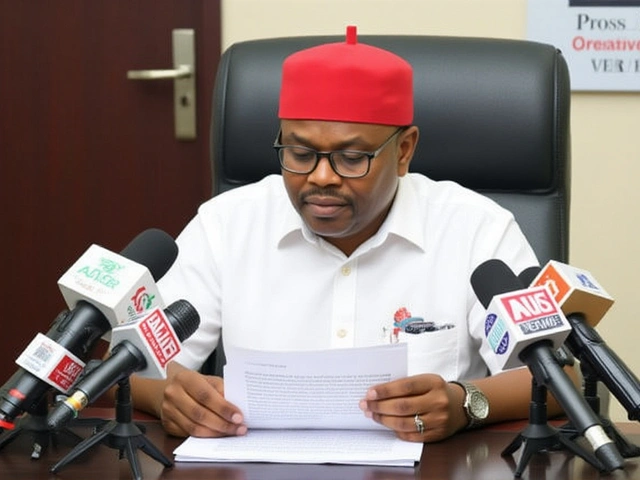Rishi Sunak's Election Announcement: A Nation Responds with Skepticism and Apathy
In a climate thick with political fatigue, Rishi Sunak's election announcement has struck a dissonant chord among the British public and political observers alike. The backdrop to his declaration—a rain-soaked appearance—has only heightened questions about his readiness and ability to inspire confidence during such a crucial time. Comparisons to underwhelming cinematic sequels are rife, casting a shadow over Sunak's optimistic portrayal of his own determination to lead the nation.
The general sentiment among voters is one of skepticism and noticeable disinterest. Despite Sunak’s political acumen and track record as Chancellor of the Exchequer, his recent moves are seen as part of a broader narrative of disenchantment with the current political class. Sunak’s announcement has inadvertently become a catalyst for a surge in emergency political podcasts, capturing the urgent need to decode the ramifications of this development. However, the nation seems less engaged than ever, reflecting a deeper malaise about the state of British politics.
The Erosion of Enthusiasm: Public Reaction
It appears that the British public is weary of political promises that rarely come to fruition. Polls suggest a tepid reception to Sunak's announcement, which isn't entirely surprising given the political turbulence that has marked recent years. His rain-soaked appearance during the announcement was symbolic, not just of the dreary weather but of the prevailing mood within the electorate. This lack of enthusiasm has translated into a perception that Sunak might not be ready to tackle the myriad challenges facing the country.
Interestingly, the announcement has also led to a speculative buzz within political circles. Many are pondering whether this move was strategically timed or merely a response to mounting pressures from within the Conservative Party. Emergency podcasts and political commentary have been rife, dissecting every element of Sunak’s strategy. However, despite this flurry of activity among pundits and politicians, the average voter remains largely unmoved.

Implications of Postponed Policies
The government’s decision to postpone its asylum removal flights to Rwanda until after the election has raised eyebrows. Critics argue that this delay represents a political maneuver designed to sidestep controversial issues during the campaign period. The postponement has added fuel to claims that the ruling party is more interested in political expediency than in resolving pressing humanitarian and immigration issues.
Similarly, the apparent abandonment of Sunak’s proposed legislation to ban smoking for young people reflects a wider problem. Public health advocates are dismayed, viewing this as yet another instance of political backpedaling in the face of potential electoral backlash. This piece of legislation had the potential to be a landmark move in public health, yet its sidelining reveals the complex balancing act politicians must navigate between their policy agendas and electoral viability.
Election Dynamics: Frontline Politicians and the Starmer Factor
The election period promises to be a tumultuous one, with several frontline politicians facing the risk of losing their seats. The unpredictability of the voter base, coupled with a lack of compelling candidates, sets a volatile stage for the upcoming elections. Rishi Sunak’s government might be banking on his debates with Labour leader Keir Starmer to sway public opinion. Sunak’s decision to participate in six TV debates underscores the high stakes involved, as the confrontations are likely to capture the public's fragmented attention.
However, it is worth noting Nigel Farage’s absence from Reform's election campaign, a move that will inevitably impact the dynamics of the election. Farage has chosen instead to explore potential opportunities in US television, a decision that underscores his unpredictable political journey and raises questions about the future direction of the Reform Party. Without Farage, the party may struggle to mobilize the level of support necessary to be a significant player in the elections.

The Quest for Quality Candidates
The election season is marked by a palpable struggle to find quality political candidates who can rejuvenate public interest. With several seasoned politicians opting out or finding themselves embroiled in scandals, the pool of credible candidates appears to be dwindling. The disillusionment within the electorate is partly attributed to this perceived decline in political talent. The vacuum created by a lack of compelling leaders provides both a challenge and an opportunity for new voices to emerge, but whether they can capture the public’s imagination is yet to be seen.
As the nation trudges towards the elections, the conversation is as much about the future of British politics as it is about immediate electoral outcomes. The skepticism and disinterest that greeted Sunak’s election announcement offer a sobering reminder of the work that lies ahead for any leader hoping to steer the country through these uncertain times. Sunak’s ability to pivot from this initial reception and galvanize support will be crucial in determining not just his political fate, but also the broader trajectory of the Conservative Party and the nation's political landscape.
The coming weeks and months will be telling. Sunak’s planned debates with Keir Starmer have the potential to either rejuvenate his campaign or further entrench public apathy. As Sunak navigates the complexities of the election season, the eyes of a weary yet hopeful electorate will be fixed on every move, speech, and policy proposal, waiting to be convinced that their disinterest and skepticism can be transformed into genuine support and engagement.








Sara Khan M
May 24, 2024 AT 18:26Another rain‑soaked TV show, and we’re all invited to the drama 😒
shubham ingale
May 24, 2024 AT 18:43Come on Sunak can still spark some hope 🚀
Ajay Ram
May 24, 2024 AT 19:00The rain that drenched Sunak’s announcement is almost a metaphor for the gloom that hangs over British politics today.
Citizens have grown accustomed to promises that evaporate like mist, leaving only the scent of disappointment.
When a leader steps onto a soaked stage, it signals not only the weather but the collective fatigue of a populace that feels unheard.
Historical cycles show that apathy is not a fixed state but a reaction to repeated failures to translate rhetoric into tangible welfare.
The suspension of the Rwanda flights, while politically convenient, illustrates how policy can be weaponised for electoral calculus rather than moral clarity.
Likewise, the abandonment of the youth smoking ban underscores a willingness to sacrifice public health on the altar of vote‑winning.
This pattern erodes trust, because each sidestepped issue adds a layer to the perception that politicians are more concerned with optics than outcomes.
Yet in the midst of this cynicism, the democratic process still offers a conduit for change if citizens choose engagement over disengagement.
The upcoming debates between Sunak and Starmer could serve as a crucible, testing whether substance can break through the veil of ennui.
If the arguments remain superficial, the public will likely retreat further into the shadows of indifference.
Conversely, a rigorous exchange grounded in policy details might rekindle a spark of curiosity among the weary voters.
It is also crucial to recognise the role of the media in amplifying or dampening the narrative; endless podcasts can either inform or simply echo the same tired grievances.
Ultimately, the health of the nation’s political life depends on a balance between accountability and the willingness of leaders to confront uncomfortable truths.
The electorate must demand more than glossy speeches; it must demand measurable actions that improve daily lives.
Only then can the cycle of skepticism be interrupted and a more hopeful political climate emerge.
Dr Nimit Shah
May 24, 2024 AT 19:08While the poetic lament is appreciated, let’s not forget that pragmatic governance requires decisive action, not endless introspection.
Ketan Shah
May 24, 2024 AT 19:33From a cultural standpoint, the British public’s disengagement mirrors the broader global trend of citizens feeling alienated from distant elites. As someone watching from the subcontinent, I see similar patterns where policy‑making feels like an echo chamber far removed from everyday struggles. It raises the question of how democratic legitimacy can be sustained when the electorate perceives a growing chasm between rhetoric and lived reality.
Aryan Pawar
May 24, 2024 AT 19:50I get the frustration but we need to keep talking it out we can’t just shut down the conversation
Shritam Mohanty
May 24, 2024 AT 19:58Sure, blame the system, but the real puppeteers are the media conglomerates feeding us fear and distraction.
Anuj Panchal
May 24, 2024 AT 20:23The policy latency observed post‑announcement indicates a strategic decoupling of legislative throughput from electoral momentum, a phenomenon commonly referred to as vote‑constrained policy inertia. This inertia often manifests as postponed reforms, especially those with contentious public perception, such as the Rwanda asylum pact or youth smoking bans, thereby preserving short‑term political capital at the expense of long‑term societal benefit.
Prakashchander Bhatt
May 24, 2024 AT 20:33That’s a solid point – if we can highlight the inertia, maybe we’ll push for more transparent timelines.
Mala Strahle
May 24, 2024 AT 20:56Observing the current political climate feels like watching a stage play where the script has been written years ago and the actors are merely reciting lines that no one in the audience asked for. The rain that drenched Sunak’s announcement is not just meteorological; it’s symbolic of the dampened spirits of voters who have been offered promises that evaporate as quickly as morning fog. Historically, when governments prioritize optics over substance, public trust erodes, leading to a feedback loop of disengagement and skepticism. Yet, there remains a flicker of hope that rigorous debate can pierce this veil of apathy. If the leaders engage earnestly on policy details-like the real implications of the postponed Rwanda flights or the health impact of abandoning the youth smoking ban-perhaps the audience will feel their concerns are finally being heard. Moreover, the media’s role in amplifying or silencing certain narratives cannot be understated; a balanced discourse could reignite civic participation. Ultimately, revitalizing democracy demands both accountable leadership and an electorate that refuses to remain passive spectators.
shubham garg
May 24, 2024 AT 21:13Let’s hope the debates bring some clarity!
LEO MOTTA ESCRITOR
May 24, 2024 AT 21:30Even in the gloom, a thoughtful discussion can plant seeds of change.